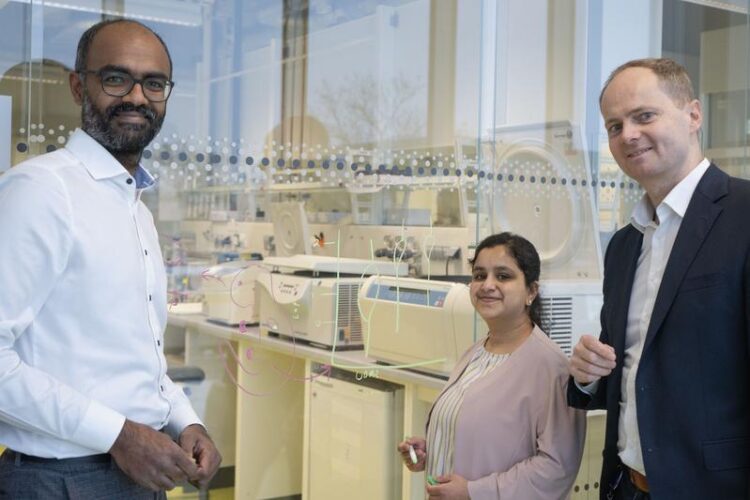AI-based algorithm enables better genetic diagnoses

Dr. Varuun Sreenivasan, Saranya Balachandran and Prof. Dr. Malte Spielmann, Institute of Human Genetics
Photo: UKSH
A team led by Saranya Balachandran, Prof. Dr. Malte Spielmann and Dr. Varuun Sreenivasan, Institute of Human Genetics at the University Hospital Schleswig-Holstein, Kiel University and the University of Lübeck, has developed the AI-based algorithm STIGMA, which enables better diagnoses of congenital diseases. Several new disease genes have already been identified.
A team from the Institute of Human Genetics at the University Hospital Schleswig-Holstein (UKSH), the Faculty of Medicine at Kiel University and the University of Lübeck has developed an algorithm that uses machine learning to predict whether gene variants can be responsible for certain diseases. This enables better diagnoses for rare congenital diseases. By working with the algorithm, called STIGMA (the acronym stands for single-cell tissue-specific gene prioritization using machine learning), the researchers have already identified several new disease genes. Their findings have been published in the renowned journal The American Journal of Human Genetics.
The function of only around a third of the more than 21,000 human genes is known. In addition, every person carries variants in their genome, most of which are part of normal personal variability, but can also cause diseases. If a rare congenital disease is suspected, genetic analyses often reveal variants that cannot be classified. In order to find out whether they play a role in the specific case, complex experimental investigations are usually necessary.
The STIGMA algorithm compares known disease genes in embryonic development with potential new disease genes. The data on the known genes comes from (single-cell sequencing), for example, such as the Human Cell Atlas. ” The algorithm can use disease genes to identify in which tissues, for example in the heart, similar genes are particularly frequently expressed, which then lead to a disease. It can predict whether a gene in which we have found a variant is responsible for a disease or is rather a normal variant that has nothing to do with it. This gives each gene a disease score, which we call the STIGMA score,” explains Saranya Balachandran, first author and research associate at the Institute of Human Genetics. She developed the algorithm together with Dr. Varuun Sreenivasan, last author and research associate at the Institute of Human Genetics.
The new algorithm has already identified several new disease genes that lead to congenital heart defects, as well as another gene that causes malformations of the hands. “Until now, genetic analyses have only led to a diagnosis in around 30 percent of patients. STIGMA can significantly improve this result. At the same time, we are expanding our knowledge of the function of individual genes – without further complex experiments, simply by using machine learning,” says Prof. Dr. Malte Spielmann, Director of the Institute of Human Genetics and also last author of the publication.
Experts from the Clinic for Congenital Heart Defects and Pediatric Cardiology at the UKSH, Kiel Campus, the Max Planck Institute for Molecular Genetics in Berlin, the Institute for Medical Genetics and Human Genetics at Charité University Medicine Berlin, the Institute for Medical Genetics at the University of Oldenburg, the German Center for Cardiovascular Research and a research institution in Pakistan were involved in the work.
Wissenschaftliche Ansprechpartner:
University Hospital Schleswig-Holstein
Institute of Human Genetics, Prof. Dr. Malte Spielmann, Tel.: 0431 500-30601, malte.spielmann@uksh.de
Originalpublikation:
Saranya Balachandran et al, STIGMA: Single-cell tissue-specific gene prioritization using machine learning, The American Journal of Human Genetics, 2024
https://doi.org/10.1016/j.ajhg.2023.12.011
Weitere Informationen:
https://www.uksh.de/Service/Presse/Presseinformationen/2024/KI_basierter+Algorit…
Media Contact
All latest news from the category: Health and Medicine
This subject area encompasses research and studies in the field of human medicine.
Among the wide-ranging list of topics covered here are anesthesiology, anatomy, surgery, human genetics, hygiene and environmental medicine, internal medicine, neurology, pharmacology, physiology, urology and dental medicine.
Newest articles

Innovative 3D printed scaffolds offer new hope for bone healing
Researchers at the Institute for Bioengineering of Catalonia have developed novel 3D printed PLA-CaP scaffolds that promote blood vessel formation, ensuring better healing and regeneration of bone tissue. Bone is…

The surprising role of gut infection in Alzheimer’s disease
ASU- and Banner Alzheimer’s Institute-led study implicates link between a common virus and the disease, which travels from the gut to the brain and may be a target for antiviral…

Molecular gardening: New enzymes discovered for protein modification pruning
How deubiquitinases USP53 and USP54 cleave long polyubiquitin chains and how the former is linked to liver disease in children. Deubiquitinases (DUBs) are enzymes used by cells to trim protein…



